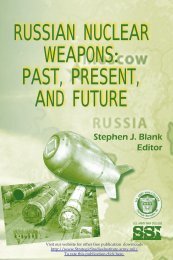The United States and China in Power Transition - Strategic Studies ...
The United States and China in Power Transition - Strategic Studies ...
The United States and China in Power Transition - Strategic Studies ...
Create successful ePaper yourself
Turn your PDF publications into a flip-book with our unique Google optimized e-Paper software.
those so-called “leaders of capitalism promoters” (“走<br />
资本主义道路的当权派”) <strong>and</strong> to “purify” the Ch<strong>in</strong>ese<br />
people. In the next 10 years, this political movement<br />
turned <strong>Ch<strong>in</strong>a</strong> upside down. <strong>The</strong> destruction of <strong>Ch<strong>in</strong>a</strong><br />
<strong>in</strong> all aspects was utterly beyond words.<br />
1978-2008: Yangwu All Over Aga<strong>in</strong>.<br />
Mao passed away <strong>in</strong> September 1976. He left beh<strong>in</strong>d<br />
a <strong>Ch<strong>in</strong>a</strong> with a dysfunctional <strong>and</strong> backward<br />
economy <strong>and</strong> a nation with over 900 million people<br />
exhausted <strong>in</strong> repeated political movements <strong>and</strong> constant<br />
preparation for war aga<strong>in</strong>st the <strong>United</strong> <strong>States</strong>,<br />
the Soviet Union, <strong>and</strong> hostile neighbors. <strong>The</strong> prospect<br />
of <strong>Ch<strong>in</strong>a</strong>’s modernization was as remote as ever.<br />
This situation was to change <strong>in</strong> 2 years. Deng Xiaop<strong>in</strong>g,<br />
a legendary figure who went through dramatic<br />
ups <strong>and</strong> downs <strong>in</strong> his political career under Mao’s<br />
dictatorial rule, emerged a w<strong>in</strong>ner <strong>in</strong> the post-Mao<br />
CCP leadership power struggle. He subsequently led<br />
the CCP leaders to put a stop to Mao’s fantasies <strong>and</strong><br />
launched the economic reform <strong>in</strong> <strong>Ch<strong>in</strong>a</strong> <strong>in</strong> 1978.<br />
Initially, few had expected Deng to make anyth<strong>in</strong>g<br />
spectacular. Yet by the late 1980s, his development<br />
policy started to turn <strong>Ch<strong>in</strong>a</strong> around. <strong>The</strong> CCP<br />
followed the footsteps of Japan, South Korea, Taiwan,<br />
Hong Kong, <strong>and</strong> S<strong>in</strong>gapore to pursue wealth through<br />
a relentless export-oriented policy. Foreign <strong>in</strong>vestment<br />
<strong>and</strong> jo<strong>in</strong>t ventures flooded <strong>Ch<strong>in</strong>a</strong>. <strong>Ch<strong>in</strong>a</strong> was<br />
soon to become the factory of the world. By the mid<br />
1990s, <strong>Ch<strong>in</strong>a</strong>-made consumer products started to fill<br />
department stores all over the world. By its 30th anniversary,<br />
Ch<strong>in</strong>ese economic development had made<br />
phenomenal progress. As shown <strong>in</strong> Figures 3-1, 3-2,<br />
3-3, <strong>and</strong> 3-4, <strong>in</strong> three vital measures of national wealth<br />
<strong>and</strong> viability, gross domestic product (GDP), trade,<br />
44

















